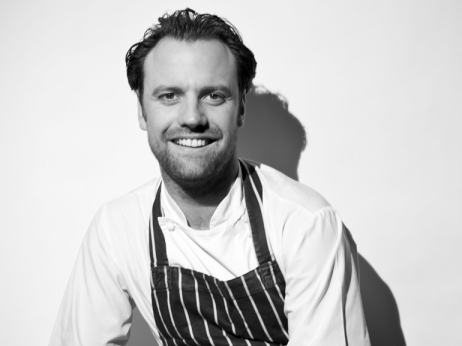Brett Graham began his career serving seafood by the water on the New South Wales north coast. Now he has joined the elite band of Michelin-star chefs and his London restaurant – The Ledbury – is one of the best in the world. The secret? His down-to-earth Australian take on hospitality.
It’s a Friday morning in London and Australian chef Brett Graham has a busy day ahead. There are 169 hopefuls on tonight’s waiting list for his Notting Hill restaurant – a place with just 55 seats. It’s always like this at The Ledbury. Every Friday and Saturday, more than 100 would-be diners hold out for a cancellation.
Culinary superstar
It’s easy to understand why so many people want to eat at The Ledbury. It has two Michelin stars and is ranked number 27 on the World’s 50 Best Restaurants list. But what makes Graham really proud is that so many diners return again and again. They sit at cream-clothed tables under hanging lights that look like glowing golden sculptures. They eat dishes such as candy beetroot baked in clay with caviar salt and smoked eel; and pear cooked in brown butter, goats-milk caramel and malt.
The food has had London critics reaching for superlatives since it opened in 2005. Recently, The Telegraph’s Ben McCormack said Graham’s langoustine wrapped in shiitake was one of the best things he ate in 2016, “either in the UK or anywhere else in the world”. But there’s something else that makes The Ledbury one of the world’s top restaurants.
Candy beetroot baked in clay with caviar salt and smoked eel is one of Brett Graham’s specialties.
Turning the tables
In The Ledbury’s early years, there were plenty of quiet days. When the financial crisis hit and restaurants started folding all over Britain, Graham realised things had to change.
“I sat down with my staff and told them that to survive this horrible time we had to do something different,” he says. “And what we were going to do was what I had always wanted to: be a bit friendlier, a bit more welcoming.”
He started inviting diners into his kitchen and taking notes on their habits and preferences.
Staff at The Ledbury know which regulars like sparkling water and who prefers to hold the fork in their right hand. They know their allergies and the names of their children.
“When I came to England, you often had service that was quite arrogant,” says Graham. “Often I went to a restaurant and I felt like I was lucky to be there. But the customers are our boss. They are in charge of our future.”
Lessons from home
Graham learnt how to make customers happy when he was a 15-year-old apprentice, serving garlic bread and crumbed calamari at Scratchleys on the Wharf, a family restaurant in the Australian coastal city of Newcastle.
Back then, he didn’t know much about cooking. He spent most of his time riding motorbikes, bushwalking and hanging out with friends from his local surf lifesaving club. Food was never a focus at home in Williamtown, half-an-hour’s drive north from Newcastle. But even as a child Graham noticed when the neighbours served “really good steak” at a barbeque and wondered what made it taste so different.
It only took a few days of work experience at Scratchleys for him to realise: “This is what I’m meant to do.”
Scratchleys was (and still is) a busy place. “I gained a lot of experience preparing fish, washing dishes and making seafood platters,” Graham says. “Neil [Slater, owner of Scratchleys] taught me by example that when you own your business, you have to look after your customers. You have to push everyone along and make sure the service is good.”
After work they’d go fishing, using leftover prawns as bait.
What Graham didn’t learn at Scratchleys was how brutal the restaurant industry can be. That came later, when he moved to Sydney to work at Liam Tomlin’s Banc, working 100 hours a week. He knew nothing of the strict hierarchies that rule high-end restaurants and did not understand kitchen jargon. When the chef called out ‘rien avant’ (mains only), Graham thought it must be someone’s name. “The chef shouted at me so much and I had no idea what I’d done wrong,” he says. “Cooking is a tough world … Those lessons he [Tomlin] taught me were invaluable and I wonder if I would have made it without him.”
Long-distance dreams
Graham never expected to end up in the UK. Even when he won the prestigious Josephine Pignolet Award for young Australian chefs in 2000, he expected the prize trip to London to be the first step of a journey around Europe, before settling back home. But then he got a job at The Square, working for chef Philip Howard, who later invited him to work with him to open a restaurant.
“I was 25 and the pressure was incredible,” Graham says of those early years at The Ledbury. “I didn’t know what I was doing … I was scared of failure. I was scared of embarrassing my friends and family. I didn’t want all that time and effort to be a waste. That’s what kept driving me – not to let anyone down.”
These days, he feels at home in England. His 17 years as an expat have softened his Australian accent and given him a love of England’s fresh produce. He has a particular passion for venison (“I do a bit of stalking and shooting”) and in 2017 will open two deer parks, one at Aynhoe Park in Oxfordshire, the other at Boughton House in Northamptonshire.
But Graham believes his Australian upbringing gave him a kind of tenacity. “Aussies just have a go,” he says.
The Ledbury in Notting Hill is so popular that it’s notoriously difficult to get a table.
Giving back
It can be hard for a kid from a small town to imagine a life and a career on the other side of the world. That’s why in 2003 Graham lent his name to the Brett Graham Scholarship, which enables talented chefs and front-of-house staff from his home region of Newcastle to work with him in London. Past winners including Troy Rhoades-Brown (now of Muse Restaurant in Australia’s Hunter Valley wine region) and Chris Thornton (Restaurant Mason in Newcastle) returned home to lead the new wave of chefs transforming the area’s dining culture. One front-of-house winner, Eliza Stevenson, went on to become The Ledbury’s head waiter.
Is Graham as tough a boss as the chefs he worked with as a young man? “I can be,” he says. “It’s a tough trade so you have to condition them to do well. To work in good restaurants you have to have skills under pressure.”
Find out more about The Ledbury.
This article was originally published on Australia Unlimited and is republished here under Creative Commons.

























Add Comment